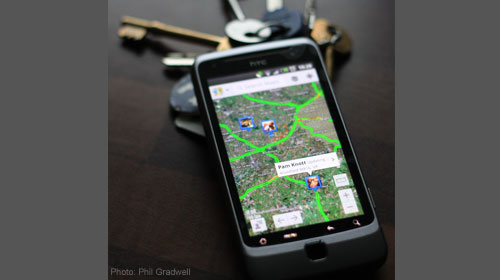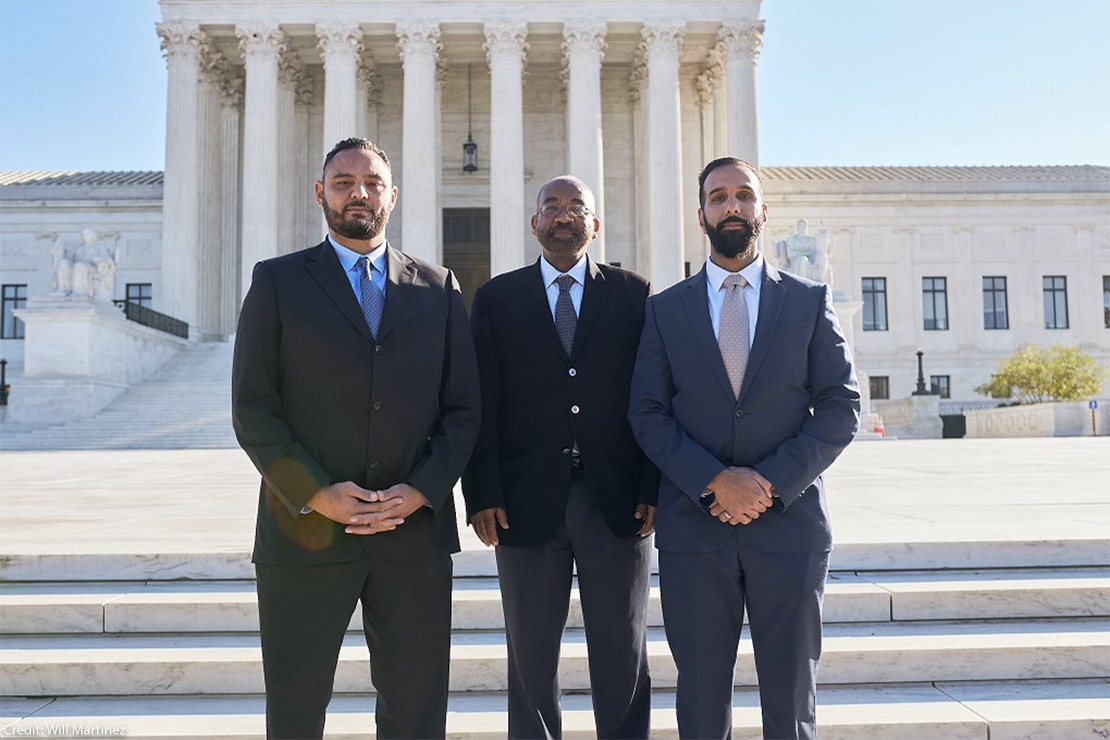Privacy & Technology
FBI v. Fazaga
In a case scheduled to be argued before the U.S. Supreme Court on November 8, 2021, three Muslim Americans are challenging the FBI’s secret spying on them and their communities based on their religion, in violation of the Constitution and federal law. In what will likely be a landmark case, the plaintiffs — Yassir Fazaga, Ali Uddin Malik, and Yasser Abdelrahim — insist that the FBI cannot escape accountability for violating their religious freedom by invoking “state secrets.” The plaintiffs are represented by the Center for Immigration Law and Policy at UCLA School of Law, the ACLU of Southern California, the American Civil Liberties Union, the Council for American Islamic Relations, and the law firm of Hadsell Stormer Renick & Dai.
Status: Closed (Judgment)
View Case
Learn About Privacy & Technology
Featured
U.S. Supreme Court
Jun 2018

Privacy & Technology
Carpenter v. United States
The Supreme Court ruled that the government needs a warrant to access a person’s cellphone location history. The court found in a 5 to 4 decision that obtaining such information is a search under the Fourth Amendment and that a warrant from a judge based on probable cause is required.
Court Case
Dec 2016

Privacy & Technology
Sarkar v. Doe - PubPeer Subpoena Challenge
The ACLU filed a motion in Michigan state court challenging the constitutionality of a subpoena issued to the website PubPeer demanding that it turn over the identities of anonymous commenters. In March 2015, the trial judge ruled that PubPeer had to unmask one – but only one – of the commenters. Both PubPeer and the researcher appealed, and the ruling was upheld in December 2016.
All Cases
70 Privacy & Technology Cases

California
Feb 2024
Privacy & Technology
Free Speech
Netchoice, LLC v. Bonta
This amicus brief highlights the constitutional defects of a California law that purports to protect consumer privacy but is actually an impermissible, content-based regulation of online speech. The brief urges that this law should be struck down while emphasizing that the court should rule narrowly and leave paths open for other consumer privacy laws to withstand First Amendment challenge.
Explore case
California
Feb 2024

Privacy & Technology
Free Speech
Netchoice, LLC v. Bonta
This amicus brief highlights the constitutional defects of a California law that purports to protect consumer privacy but is actually an impermissible, content-based regulation of online speech. The brief urges that this law should be struck down while emphasizing that the court should rule narrowly and leave paths open for other consumer privacy laws to withstand First Amendment challenge.

Michigan
Jan 2024
Privacy & Technology
+2 Issues
Williams v. City of Detroit
This case seeks to hold Detroit police accountable for the wrongful arrest of our client due to officers’ reliance on a false match from face recognition technology.
Explore case
Michigan
Jan 2024

Privacy & Technology
+2 Issues
Williams v. City of Detroit
This case seeks to hold Detroit police accountable for the wrongful arrest of our client due to officers’ reliance on a false match from face recognition technology.

New Jersey
Jan 2024
Privacy & Technology
Parks v. McCormac
On January 29, 2024, the ACLU and the ACLU of New Jersey filed an amicus brief in the U.S. District Court for the District of New Jersey in support of Plaintiff Nijeer Parks. The brief argues that law enforcement’s wrongful arrest of Mr. Parks due to police reliance on unreliable facial face recognition technology violated Mr. Parks’s constitutional rights.
Explore case
New Jersey
Jan 2024

Privacy & Technology
Parks v. McCormac
On January 29, 2024, the ACLU and the ACLU of New Jersey filed an amicus brief in the U.S. District Court for the District of New Jersey in support of Plaintiff Nijeer Parks. The brief argues that law enforcement’s wrongful arrest of Mr. Parks due to police reliance on unreliable facial face recognition technology violated Mr. Parks’s constitutional rights.

Massachusetts Supreme Court
Nov 2023
Privacy & Technology
+2 Issues
Commonwealth v. Arrington
In this amicus brief, the ACLU and its coalition partners urged robust application of the legal standard governing the admissibility of expert testimony and technical evidence, especially in cases involving opaque or proprietary algorithms.
Explore case
Massachusetts Supreme Court
Nov 2023

Privacy & Technology
+2 Issues
Commonwealth v. Arrington
In this amicus brief, the ACLU and its coalition partners urged robust application of the legal standard governing the admissibility of expert testimony and technical evidence, especially in cases involving opaque or proprietary algorithms.

Kansas
Sep 2023
Privacy & Technology
National Security
United States v. Hay
This case concerns whether long-term, continuous use of a surveillance camera targeted at a person’s home is a Fourth Amendment search.
Explore case
Kansas
Sep 2023

Privacy & Technology
National Security
United States v. Hay
This case concerns whether long-term, continuous use of a surveillance camera targeted at a person’s home is a Fourth Amendment search.
